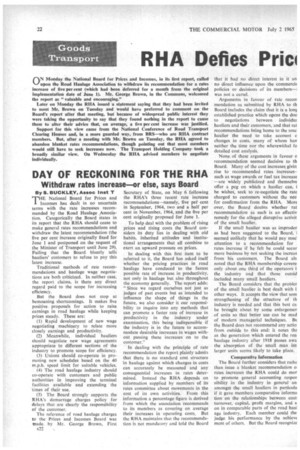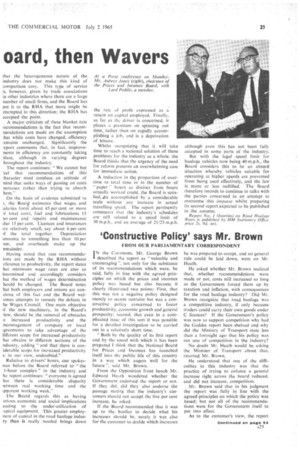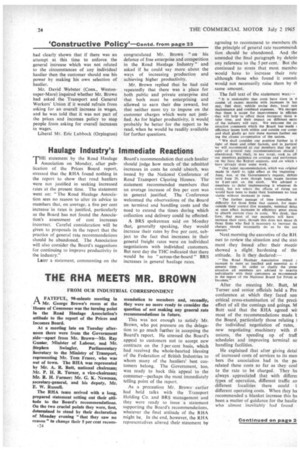Goods Transport
Page 24

Page 25

Page 26

If you've noticed an error in this article please click here to report it so we can fix it.
RHA Defies Priv °ad, then Wavers
ON Monday the National Board for Prices and Incomes, in its first report, called upon the Road Haulage Association to withdraw its recommendation for a rates increase of five per cent (which had been deferred for a month from the original implementation date of June 1). Mr. George Brown, in the Commons, welcomed the report as " valuable and encouraging."
Later on Monday the RHA issued a statement saying that they had been invited to meet Mr. Brown on Tuesday and would have preferred to comment on the Board's report after that meeting, but because of widespread public interest they were taking the opportunity to say that they found nothing in the report to cause them to alter their advice that, on average, a five per cent increase was justified.
Support for this view came from the National Conference of Road Transport Clearing Houses and, in a more guarded way, from BRS—who are RHA contract members, But, after a meeting with Mr. Brown on Tuesday, the RHA agreed to abandon blanket rates recommendations, though pointing out that most members would still have to seek increases now. The Transport Holding Company took a broadly similar view. On Wednesday the RHA advised members to negotiate individually.
DAY OF RECKONING FOR THE RHA
Withdraw rates increase—or else, says Board
By S. BucKLay, Assoc I nst T 11ENational Board for Prices and comes has dealt in no uncertain terms with the rate increases recommended by the Road Haulage Association. Categorically the Board states in its report that the RHA should cease to make general rates recommendations and withdraw the latest recommendation (the five per cent increase originally fixed for June 1 and postponed on the request of the Minister of Transport until June 29). Failing that the Board bluntly tells hauliers' customers to refuse to pay this latest increase.
Traditional methods of rate recommendations and haulage wage negotiations are both criticized. In neither case, the report claims, is there any direct regard paid to the scope for increasing efficiency.
But the Board does not stop at bemoaning shortcomings. It makes five positive proposals for action to raise earnings in road haulage while keeping prices steady. These are:
(1) Rapid development of new wage negotiating machinery to relate more closely earnings and productivity.
(2) Meanwhile, individual hauliers should negotiate new wage agreements appropriate to different sections of the industry to promote scope for efficiency.
(3) Unions should co-operate in promoting new schedules based on the 40 m.p.h. speed limit for suitable vehicles.
(4) The road haulage industry should co-operate with customers and public authorities in improving the terminal facilities available and extending the times of their use.
(5) The Board strongly supports the RFIA's demurrage charges policy for delays that are clearly the responsibility of the customer.
The reference of road haulage charges to the Prices and Incomes Board was made. by Mr. George Brown, First a22 Secretary of State, on May 6 following the RHA's three recent rate increase recommendations—namely, five per cent in September, 1964, two and a half per cent in November, 1964, and the five per cent originally proposed for June 1.
To help deal with the problem of rising prices and rising costs the Board considers its duty lies in dealing with old habits, inherited attitudes and institutional arrangements that all combine to exert an upward pressure on prices.
In dealing with this first item to be referred to it, the Board has asked itself whether the pricing practices in road haulage have conduced to the fastest possible rate of increase in productivity, not only in haulage but also throughout the economy generally. The report adds: " Since we regard ourselves not just as judges of past events but as intended to influence the shape of things in the future, we also consider it our responsibility to inquire into any methods that can promote a faster rate of increase in productivity in the industry under examination, this being indispcnsible if the industry is in the future to accommodate desirable increases in wages without passing these increases on to the customer.'
In dealing with the principle of rate recommendation the report plainly admits that there is no standard cost structure in haulage against which changes in costs can accurately be measured and any consequential increases in rates determined. Instead the RHA depends on information supplied by members of its rates committee about movements in the cost of its own activities. From this information a percentage figure is derived from which the association recommends to its members as covering on average their increases in operating costs. But the RHA maintains that the recommendation is not mandatory and told the Board that it had no direct interest in it an no direct influence upon the commercia policies or decisions of its members— was not a cartel.
Arguments in favour of rate recorr rnendation as submitted by RHA to th Board includes the claim that it is a lonE established practice which opens the doe to negotiations between individua hauliers and their customers, and that rat recommendations bring home to the sma haulier the need to take account changes in costs, many of whom hay neither the time nor the wherewithal fo detailed cost analysis.
• None of these arguments in favour c recommendation seemed decisive to th Board. Many of the cost increases givin rise to recommended rates increases– such as wage awards or fuel tax increase —are widely publicized and themselve offer a peg on which a haulier can, i he wishes, seek to re-negotiate the rate charged to customers without the nee for confirmation from the RHA. More over, the Board doubts whether rat recommendation as such is an effectiv remedy for the alleged disruptive activit of the small haulier.
If the small haulier was as impruder as had been suggested to the Board, seemed unlikely that he would pay muc attention to a recommendation for rates increase if he felt he could secur more business by not seeking the increas from his customers. The Board als noted that the RHA membership covere only about one third of the operators i the industry and that those cnitsid included many small hauliers.
The Board considers that the probler of the small haulier is best dealt with i other ways. It accepts the view that torn strengthening of the structure of th industry is needed and that this best ca be brought about by some enlargemer of units so that better use can be mad of modern managerial techniques. Ba the Board does not recommend any actio from outside to this end: it notes thr as the generation which entered the roa haulage industry after 1918 passes awa the absorption of the. small man int larger units seems likely to take place.
Comparative Information The Board further considers that rathc than issue a blanket recommendation o rates increases the RHA could do mor to promote general accounting respor sibility in the industry in general an amongst the small hauliers in particula if it gave members comparative informr tion on the relationships between cosy turnover, capital, profit margins, and s on in comparable parts of the road haul age industry. Each member could the judge his performance by the achieve merit of others. But the Board recognize that the heterogeneous nature of the industry does not make this kind of comparison easy. This type of service is, however, given by trade associations M. other industries where there are a large number of small firms, and the Board has put it to the RHA that more might be ittempted in this direction: the RHA has iccepted the point.
A major criticism of these blanket rate recommendations is the fact that recommendations are made on the assumption :hat while costs have changed, efficiency remains unchanged. Significantly the mport comments that, in fact, improvements in efficiency are constantly taking ?lace, although in varying degrees .hroughout the industry.
The report continues: "We cannot but 'eel that recommendations of this tharacter must conduce an attitude of nind that seeks ways of passing on costs nereases rather than trying to absorb hem."
On the basis of evidence submitted to t, the Boar estimates that wages and ;alaries form about 45 per cent or more if total costs, fuel and lubrications 15 )er cent and repairs and maintenance dlso 15 per cent. Licences and insurances tre relatively small, say about 6 per cent )1 the total together. Depreciation ;mounts to something less than 10 per !ent. and overheads make up the 'emainder.
Having noted that rate recommendaions arc made by the RHA without eference to productivity, the report states hat minimum wage rates are also so letermined and accordingly considers hat the method of wages determination hould be changed. The Board notes hat both employers and unions are concious of this fact and the Board welmmes attempts to remedy the defects in he Wages Council. One main objective )1 the new machinery, in the Board's should be the removal of obstacles o increased productivity and the :ncouragement of company or local Lgreements to take advantage of the lifferent scope for increased productivity hat obtains in different sections of the ndustry, adding and that there is coniderable scope for increased productivity s. irt our view, undoubted."
Relative to drivers' hours, one spokesnan before the Board referred to" the 1-hour complex" in the industry and he report continues: everyone is agreed hat there is considerable disparity )etween real working time and the ipparent working week."
The Board regards this as having erious economic and social implications eading to the under-utilization of .apital equipment. This greater employnent of capital in the road haulage indusry than is really needed brings down the rate of profit expressed as a return on capital employed. Finally, as far as the driver is concerned, it places a premium on spinning out time, rather than on rapidly accomplishing a job, and is a deprivation of leisure.
Whilst recognizing that it will take time to reach a national solution of these problems for the industry as a whole, the 'Board thinks that the urgency of the need for reform presents an overwhelming case for immediate action. • A reduction in thc proportion of overtime to total time or in the number of " paper " hours as distinct from hours actually worked could, the Board is satisfied, .be accomplished by a considerable scale without any increase in actual travelling speed. The report pertinently comments that the industry's schedules are still related to a speed limit of 30 m.p.h., and an average of 21/23 m.p.h. although even this has not been fully accepted in some parts of the industry.
But with the legal speed limit for haulage vehicles now being 40 m.p.h., the Board considers this to, be an absurd situation whereby vehicles suitable for operating at higher speeds. are prevented from being used effectively, and the law is more or less nullified, The Board therefore intends to continue in talks with the parties concerned in • an attempt to overcome this impasse whilst preparing its second report expected to be published in the autumn.
Report No. I (Interim) on Road Haulage Rates is published by HIVI Stationery Office. price 2s, 9d. net.
'Constructive Policy' says Mr. Brown
FROM OUR PARLIAMENTARY CORRESPONDENT
I Nthe Commons, Mr. George Brown described the report as "valuable and encouraging ", not only for the substance of its recommendations which were, he said, fully in line with the agreed principles on which the prices and incomes policy was based but also because it clearly illustrated two points: First, that this was not a negative policy designed merely to secure restraint but was a constructive policy concerned to foster productivity, economic growth and general prosperity; second, that even in a complicated issue of this sort it was possible for a detailed investigation to be carried out irt a relatively short time.
"Both by the quality of its first report arid by the speed with which it has been prepared I think that the National Board for Prices and Incomes has launched itself into the public life of this country in a way which augers well for the future ", said Mr. Brown.
From the Opposition front bench Mr. Edward Heath wondered whether the Government endorsed the report or not. If they did, did they also endorse the passage stating that the industry's customers should not accept the five per cent increase, he asked.
If the Board recommended that it was up to the haulier to decide what his increases should be, surely it was also for the customer to decide which increases he was prepared to accept, and no general rule could be laid down, went on Mr. Heath.
He asked whether Mr. Brown realized that, whether recommendations were made or not, costs still increased so long as the Government forced them up by taxation and inflation, with consequences for the road haulage industry? Did Mr. Brown recognize that road haulage was a competitive industry, if only because traders could carry their own goods under C licences? If the Government's policy was now to support competition why had the Geddes report been shelved and why did the Ministry of Transport state less than a fortnight ago that his policy was not one of competition in the industry?
No doubt Mr. Heath would be asking the Minister of Transport about that, retorted Mr. Brown, He understood that one of the difficulties in this industry was that the practice of trying to enforce a general increase right across the board reduced. and did not increase, competition.
Mr. Brown said that in his judgment the report was fully in line with the agreed principles on which the policy was based; but not all of the recommendations were for the Government itself to put into effect.
As to the customer's view, the report had clearly shown that if there was an attempt at this time to enforce the general increase which was not related to the circumstances of any individual haulier then the customer should use his power by making his own selection of haulier.
Mr. David Webster (Cons., Westonsuper-Mare) inquired whether Mr. Brown had asked the Transport and General Workers' Union if it would refrain from asking for an overall increase in wages, and he was told that it was not part of the prices and incomes policy to stop people from asking for overall increases in wages.
Liberal Mr. Eric Lubbock (Orpington) congratulated Mr. Brown "on his defence of free enterprise and competition in the Road Haulage Industry" and asked if he could say more about the ways of increasing production and achieving higher productivity.
Mr. Brown replied that he had said repeatedly that there was a place for both public and private enterprise and that both must be enterprising and allowed to earn their due reward, but that neither must try to impose on the customer charges which were not justified. As for higher productivity, it would probably be better for the report to be read, when he would be readily available for further questions.
























































































































